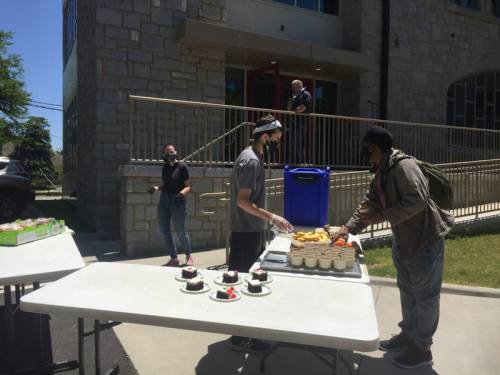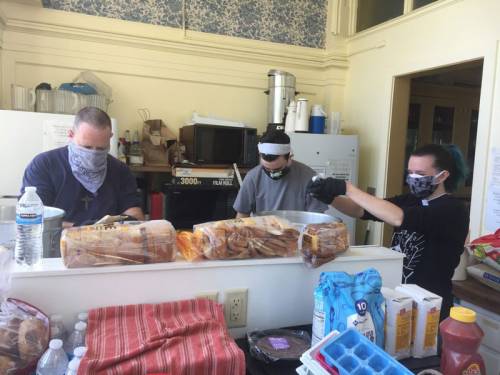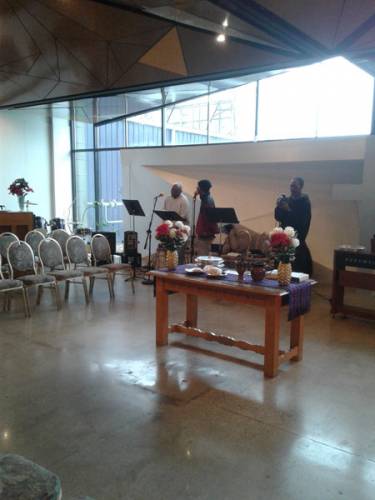Some PC(USA) congregations have expanded services as needs have grown due to COVID-19
by Rich Copley | Presbyterian News Service

On one of the first days concerns about the coronavirus were setting in, ministers at Mercy Community Church in Atlanta moved people into the parking lot and held a question-and-answer session to address people’s concerns. (Courtesy Mercy Community Church)
LEXINGTON, Kentucky — It was early March, and the daily routine at Atlanta’s Mercy Community Church had been thrown for a loop.
Every day, Monday through Thursday, the church is a gathering place for around 50 people who are experiencing homelessness or are marginally housed to do everything from talking and sharing a couple of meals to working on getting help with legal and medical issues, as well as other needs. But suddenly, with the rapid spread of the coronavirus that causes COVID-19, gathering wasn’t a great idea.

Mercy Community Church tried to take as much activity as possible outside, including serving meals, since the onset of the COVID-19 pandemic. (Courtesy Mercy Community Church)
“Everybody spread out! We’re meeting in the parking lot today,” the Rev. Brittany Fiscus-van Rossum, one of two Presbyterian Church (U.S.A.) pastors for the ecumenical congregation, recalls saying.
That was the first day of what has become an exhausting emotional rollercoaster of a few months continuing to minister to a population that can access few of the precautions people are told to take to protect themselves from the coronavirus, including staying at home and meticulous personal hygiene.
Mercy is one of many congregations across the United States that was forced to adapt its ministry to people who are experiencing homelessness or marginal housing when the COVID-19 pandemic started. For some, this meant expanding services the church was already offering, including shelter.

Officer Mike Cruzan of the Seattle Police Department speaks at a public meeting in February regarding the SHARE shelter for people experiencing homelessness at Northminster Presbyterian Church. (Courtesy Northminster Presbyterian Church)
Northminster Presbyterian Church in Seattle had just transitioned from being part of a rotating group of churches offering overnight shelter to a group of men who are homeless to offering shelter seven nights a week at the beginning of this year. When the pandemic hit, the group Northminster works with, SHARE (Seattle Housing and Resource Effort), asked if the church could become a 24-hour shelter to help keep around 15 clients safe and out of circulation until a stay at home order is lifted.
“It’s probably one of the best things we could have done,” said the Rev. Dani Forbess, pastor of Northminster. “It puts the facility to the best possible use it could have at this time. We have been able to be part of the solution in a significant way.”
24/7
It wasn’t easy. The church, located in an affluent residential neighborhood across from an elementary school, already had to go through public meetings with some pushback to establish the seven-night-a-week shelter. Now it had to go back to present the 24-hour plans during the pandemic. But with session and community approval, Northminster became a round-the-clock shelter in late March.
One regret Forbess allows is since the pandemic hit shortly after the shelter started, she says the congregation has not had much chance yet to engage with the people they are serving. The shelter is self-managed by residents, and Forbess says it has been managed well, though constant use of the facility has created a few situations such as a plumbing problem and higher-than-normal utility bills.
Helping soften the financial blow, compounded by a decrease in giving most churches are seeing, is a Presbyterian Disaster Assistance (PDA) COVID-19 Emergency Assistance Grant to support this vital ministry going through the pandemic.
Click here to support Presbyterian Disaster Assistance’s response to the COVID-19 pandemic.
“There are many PC(USA) congregations that are engaged in meaningful ministries with those experiencing homelessness,” said the Rev. Jim Kirk, PDA Associate for National Disaster Response. “The COVID-19 pandemic significantly increased the number of families and individuals facing housing insecurity. It is inspiring to hear of the timely and adaptive ways our PC(USA) family is responding with the love of Christ. As a result of thoughtful and faithful action, those who are hungry are fed, those in need of shelter are cared for and all are finding hope.”

Mercy Community Church staff in masks and gloves prepare lunch. (Courtesy Mercy Community Church)
The Presbyterian Hunger Program (PHP), one of PDA’s fellow Compassion, Peace & Justice ministries, has also administered grants to congregations working to meet the needs of people experiencing hunger and homelessness during the pandemic. One of the issues Andrew Kang Bartlett, PHP Associate for National Hunger Concerns, sees illuminated by COVID-19 is affordable housing.
“As more people are hurt by the economic downturn, access to affordable housing will be critical to keeping the number of unhoused people low,” he said. “So, we are grateful for the PC(USA) congregations that participate in Congregation-Based Community Organizing coalitions, which are advocating for affordable housing around the country.”
Affordable housing
While direct feeding programs are critical to keep people going, Marc Greenberg of the Interfaith Assembly on Homelessness and Housing (IAHH) in New York says public policy advocacy and other long-term solutions are vital to address housing issues exacerbated by COVID-19.
“The role of advocacy is crucial, because so many decisions are being made right now,” Greenberg, IAHH’s executive director said. “The faith community often needs to initiate the conversations — realistic conversations about people’s needs and how we address them.
“We now have an opportunity to really shift things. The Band-Aid has been ripped off. How can we seize this opportunity?”
And that’s not just a question of what governments can do. Greenberg said churches need to look at their own resources.
“We encourage congregations to take out their pews so they can be multi-purpose rooms and fully utilize their resources,” Greenberg said.
Fiscus-van Rossum at Mercy in Atlanta wrote a blog post, responding to the often-invoked sentiment, early in the pandemic, that the church is not a building, it’s the people. She wrote, “while the assertion is true, buildings sure are nice when you believe the work of the church is to shelter the poor and homeless, cook food for the hungry, and care for the sick and hurting.”
She acknowledged some irony writing that, given Mercy rents its space from another church. But, in an interview, she said the Mercy staff has contemplated what they could do with a place of their own to serve the community.
Keeping the community together

The Rev. Charles Hurst says moving North Presbyterian Church into a new space it shares with a Lutheran ministry has helped raise the spirits of the congregation with better lighting and aesthetics. (Courtesy of North Presbyterian Church)
In Cleveland, the Rev. Charles Hurst was already familiar with affordable housing needs and actions leading North Presbyterian Church, which he describes as a “zero-income church,” primarily serving those who are homeless or marginally housed. A few years ago, the church left its historic home in an older, expensive-to-maintain facility to share space with Lutheran Metropolitan Ministry in a renovated factory building. The church has had its successes, including a men’s singing group that gets invited to perform at gigs around the area. But there are challenges, and Hurst says COVID-19 has made them worse.
“We’ve tried to keep in touch with phones and bringing people food,” Hurst said.
Some people, he said, have found places to stay at hotels that have opened to people who are homeless. The church has worked to continue to pay the modest staff it has, and it has been awarded a PDA COVID-19 Emergency Assistance Grant that will support this crucial ministry. One of North’s sources of income is partnerships with suburban churches that come join in worship and help prepare meals, usually also contributing in the offering plate. But those relationships have been disrupted, like everything else.

North Presbyterian Church in Cleveland is now housed in a renovated factory building it shares with a Lutheran ministry. (Photo courtesy of North Presbyterian Church)
“It has been hard on people losing touch with people they consider important,” Hurst said of the detachment the virus and cancellation of in-person services has brought. Most of North’s members, he points out, couldn’t view a video service if there was one because they don’t have computers or smartphones. But he also knows there would be danger bringing people together.
“Part of being homeless is having health issues, so we want to be careful,” Hurst said. “It’s disrupted so much. You spend a lot of time getting a program up, and now you have to start again.”

People in the Mercy congregation social distancing and lifting up prayer concerns while waiting for lunch. (Courtesy Mercy Community Church)
Mercy does have an online service for the few members who are housed and have internet access. But Fiscus-van Rossum knows that serves only a small portion of their congregation, which has grown since the start of the pandemic.
She is thankful that with the support of Atlanta officials, including Mayor Keisha Lance Bottoms, who deem services to people who are homeless essential, so she and the staff can continue to meet with people in their congregation, with proper protections. As a group they have endured a lot the last couple months, including the deaths of two members — one to COVID-19 – and the restrictions on contact can be particularly hard for people at Mercy.
“In our community, shaking hands, looking each other in the eye and embracing are so much part of our bond,” Fiscus-van Rossum said. “We don’t want people to feel like we don’t want to shake their hands anymore. We realize so many of us are vulnerable.
“Every human being has dignity. I can’t wait for the day when we can pass the peace, and hug, and look at one another’s unmasked faces.”
Give to One Great Hour of Sharing to support the work of the Presbyterian Hunger Program and Presbyterian Disaster Assistance.
![]() You may freely reuse and distribute this article in its entirety for non-commercial purposes in any medium. Please include author attribution, photography credits, and a link to the original article. This work is licensed under a Creative Commons Attribution-NonCommercial-NoDeratives 4.0 International License.
You may freely reuse and distribute this article in its entirety for non-commercial purposes in any medium. Please include author attribution, photography credits, and a link to the original article. This work is licensed under a Creative Commons Attribution-NonCommercial-NoDeratives 4.0 International License.
Categories: Disaster Response, Faith & Worship, Hunger & Poverty, Matthew 25
Tags: compassion peace & justice, coronavirus, covid-19, homelessness, hunger, mercy community church atlanta, north presbyterian church cleveland, northminster presbyterian church, One Great Hour of Sharing, poverty, presbyterian disaster assistance, presbyterian hunger program, Special Offerings
Ministries: Presbyterian Disaster Assistance, Compassion, Peace and Justice, Presbyterian Hunger Program